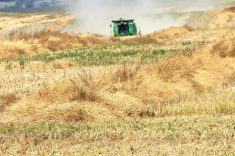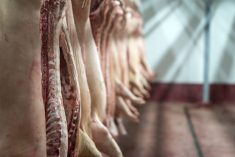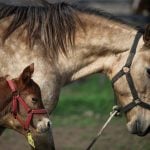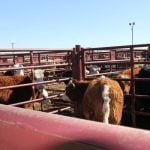MarketsFarm — Besides shutting down entire cities and killing more than 1,000 people, China’s novel coronavirus outbreak has wreaked havoc on North America’s hog futures.
“It’s a dubious relationship, but it is impacting markets,” said Tyler Fulton, risk management director for Hams Marketing Services in Winnipeg.
Lean hog futures moved “in concert with drops in the financial markets” a few weeks ago, when concerns of the coronavirus began dominating headlines.
“That wasn’t a coincidence,” said Fulton, noting concerns of the virus triggering a recession in China resulted in two limit-testing moves in consecutive trading sessions.
Read Also

U.S. livestock: Cattle fall sharply as Trump says he’s working to lower beef costs
Chicago cattle futures fell sharply on Friday after U.S. President Donald Trump said his administration was working to lower the…
“Practically, it’s not rational,” he said. “But sometimes futures markets don’t care that much about practicality.”
North America’s hog futures market had been largely driven by expectations of large demand from China, after African swine fever wiped out a large swath of that country’s pork supply in 2019.
February lean hog contracts are nearing expiration, but trading around US$56 per hundredweight, which is “really very weak.”
The next contract is about US$65 per hundredweight, which is slightly stronger but still only about US$4 above contract lows.
“For the last several months, a lot of analysts have been anticipating some support coming in from the Chinese marketplace, especially closer to the Chinese Lunar New Year,” Fulton said. “But that demand never showed up.”
But while nearby contracts are hovering around lows, Fulton noted there is optimism further out.
“The market is projecting some type of recovery and resolution to the issue,” he said, citing the “extraordinary measures” China has undertaken to quarantine large cities impacted by the coronavirus.
“If they prove to be fairly successful and reduce the spread of the disease, then lean hog futures should recover some of what they’ve lost,” he said. “There’s no reason why not.”
Brad Marceniuk, a provincial livestock economist in Saskatoon, said cash prices have also been under pressure due to assumptions that China’s pork consumption has been lower.
“A lot of people are staying home, there are fewer people eating in restaurants,” he said.
However, he noted, “people still have to eat” and it’s very likely people are still eating pork, just doing so at home. Market uncertainty stems from delays in published consumption data.
“So there’s some uncertainty regarding how much pork will be consumed in the near future,” he said.
Pork cash prices will be influenced by the quarantine-like conditions in parts of China, which could impact the import supply chain.
“Are the ports working, is stuff moving through cities, how much is closed?” Marceniuk said. “We don’t have a great idea of that.”
— Marlo Glass reports for MarketsFarm in Winnipeg.
















